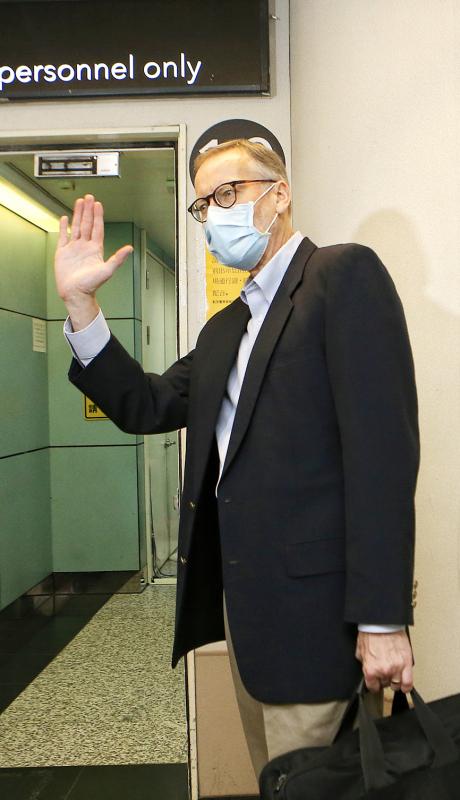Sandra Oudkirk yesterday took over as director of the American Institute in Taiwan (AIT) as the country bid farewell to her predecessor, Brent Christensen, who departed for the US.
Oudkirk was seen arriving at Taiwan Taoyuan International Airport on Monday with a mask bearing the greeting, “Hello Taiwan.”
The AIT in a statement yesterday described Oudkirk as a 30-year veteran of the US Foreign Service with a deep understanding of East Asia and Pacific affairs.

Photo: Tony Yao, Taipei Times
She is expected to start in her new role after completing 14 days of quarantine and seven days of self-health management in accordance with Taiwan’s COVID-19 protocols, the AIT said.
Oudkirk “looks forward to building on the successes of her predecessors and to further advancing the US-Taiwan relationship,” it said.
Christensen, who had been the de facto US representative in Taiwan since 2018, arrived at the airport with Taiwanese officials at about 8:30am.

Photo: Tony Yao, Taipei Times
Christensen told reporters that he would “absolutely” return to visit Taiwan.
He was seen waving to reporters as he entered customs to board a US-bound United Airlines flight.
“The first time I left my hometown at age 19, it was to come to Taiwan,” Christensen wrote in a farewell letter released by the AIT on Friday last week.
“From that early age, Taiwan became synonymous for me with the ideas of exchange and understanding, exploration and adventure,” he wrote.
“I may be leaving Taiwan, but Taiwan will never leave me,” he added.
Christensen received a warm send-off from Democratic Progressive Party politicians, who hailed his tenure as a period of significant breakthroughs in Taiwan-US relations.
On June 25, President Tsai Ing-wen (蔡英文) awarded Christensen the Order of the Brilliant Star with Grand Cordon in commendation of his efforts in advancing bilateral relations, including facilitating the delivery of 2.5 million doses of the Moderna COVID-19 vaccine from the US.
Vice President William Lai (賴清德), Kaohsiung Mayor Chen Chi-mai (陳其邁) and Tainan Mayor Huang Wei-che (黃偉哲) also thanked Christensen for his contributions to Taiwan.
When asked about his gift of Aiwen mangoes to Christensen, Huang said the fruit was originally imported from Florida and to him it symbolized the friendship between the two countries.
“I hope Christensen was able to enjoy the sweetness of this famous Tainan produce, to show my thanks for the fruitfulness of the bilateral relationship that has prospered under his watch over the past years,” Huang said.

POSITIVE DEVELOPMENT: Japan and the US are expected to hold in-depth discussions on Taiwan-related issues during the meeting next month, Japanese sources said The holding of a Japan-US leaders’ meeting ahead of US President Donald Trump’s visit to China is positive news for Taiwan, former Japan-Taiwan Exchange Association representative Hiroyasu Izumi said yesterday. After the Liberal Democratic Party’s landslide victory in Japan’s House of Representatives election, Japanese Prime Minister Sanae Takaichi is scheduled to visit the US next month, where she is to meet with Trump ahead of the US president’s planned visit to China from March 31 to April 2 for a meeting with Chinese President Xi Jinping (習近平). Japan and the US are expected to hold in-depth discussions on Taiwan-related issues during the

‘LIKE-MINDED PARTNER’: Tako van Popta said it would be inappropriate to delay signing the deal with Taiwan because of China, adding he would promote the issue Canadian senators have stressed Taiwan’s importance for international trade and expressed enthusiasm for ensuring the Taiwan-Canada trade cooperation framework agreement is implemented this year. Representative to Canada Harry Tseng (曾厚仁) in an interview with the Central News Agency (CNA) said he was increasingly uneasy about Ottawa’s delays in signing the agreement, especially as Ottawa has warmed toward Beijing. There are “no negotiations left. Not only [is it] initialed, we have three versions of the text ready: English, French and Mandarin,” Tseng said. “That tells you how close we are to the final signature.” Tseng said that he hoped Canadian Prime Minister Mark Carney

President William Lai (賴清德) yesterday bestowed one of Taiwan’s highest honors on Saint Vincent and the Grenadines (SVG) Ambassador Andrea Clare Bowman in recognition of her contributions to bilateral ties. “By conferring the Order of Brilliant Star with Grand Cordon on Ambassador Bowman today, I want to sincerely thank her, on behalf of the Taiwanese people, for her outstanding contribution to deepening diplomatic ties between Taiwan and SVG,” Lai said at a ceremony held at the Presidential Office in Taipei. He noted that Bowman became SVG’s first ambassador to Taiwan in 2019 and

A man walks past elementary school artworks at the Taipei Lantern Festival in Ximen District yesterday, the first day of the event. The festival is to run from 5pm to 10pm through March 15.